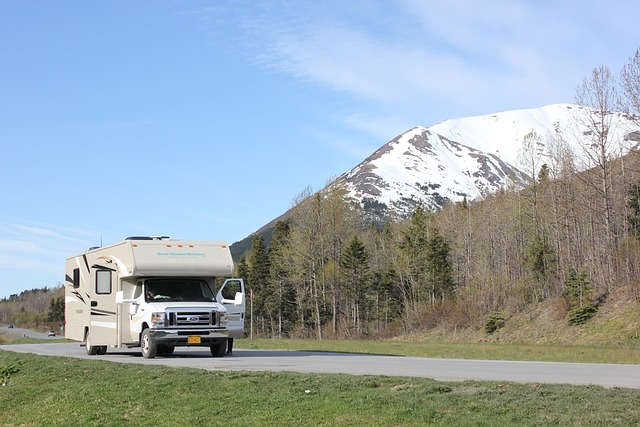Eco-conscious RVing for Beginners focuses on reducing environmental impact by adopting sustainable practices. New RVers should invest in energy-efficient RVs and solar panels to harness clean energy, utilizing the latest advancements in battery technology to store it effectively. Water conservation measures, such as fixing leaks, using low-flow fixtures, and recycling water where possible, are essential. Composting organic waste and following local recycling rules help minimize waste. By carefully managing resources, prioritizing energy independence with solar power, and choosing responsible campsites, RVers can enjoy their travels while preserving the natural beauty they encounter for future generations. This approach to RVing for Beginners not only enriches the travel experience but also contributes to a healthier planet.
Embarking on RV adventures can be both exhilarating and environmentally impactful. In “RVing for Beginners,” we explore eco-friendly practices tailored for the modern traveler who seeks to minimize their footprint while on the road. From harnessing solar power and innovative battery technologies to mastering composting, recycling, and water conservation, this guide is your compass to sustainable RV living. Discover how you can integrate these practices into your journey and contribute positively to the preservation of our planet’s beauty.
- Embracing Sustainability: Eco-Friendly RV Practices for Minimizing Environmental Impact in RVing for Beginners
- Energy Efficiency: Solar Power and Battery Technologies for Sustainable RV Living in RVing for Beginners
- Waste Reduction Strategies: Composting, Recycling, and Water Conservation Tips for Eco-Conscious RVers in RVing for Beginners
Embracing Sustainability: Eco-Friendly RV Practices for Minimizing Environmental Impact in RVing for Beginners

Eco-friendly RV practices are essential for those embarking on RV journeys to minimize their environmental footprint. For beginners in RVing for Beginners, understanding and implementing sustainable habits can significantly reduce the impact of travel on natural habitats and resources. One of the first steps is choosing the right RV that offers energy-efficient appliances and systems. These models are designed to consume less water, electricity, and fuel, aligning with eco-conscious principles from the outset.
Furthermore, RVers can adopt practices such as using solar panels to generate clean energy, which powers essential devices and appliances without relying on fossil fuels. Conservation of resources is also paramount; this includes simple acts like fixing leaks, using biodegradable soaps and detergents, and properly disposing of waste at designated facilities. Additionally, beginners should be mindful of their campfire use, opting for established fire pits to minimize ecological disruption and adhering to ‘Leave No Trace’ principles by leaving campsites as pristine as they were found. By integrating these eco-friendly RV practices into their travels, RVers can enjoy the beauty and diversity of natural environments while responsibly contributing to their preservation.
Energy Efficiency: Solar Power and Battery Technologies for Sustainable RV Living in RVing for Beginners

Embarking on an RVing journey can be a harmonious blend of adventure and environmental responsibility. For beginners navigating the world of sustainable RV living, energy efficiency is paramount in minimizing environmental impact. One of the most effective ways to enhance energy efficiency in your RV is by harnessing solar power. Solar panels are an excellent investment for those new to eco-conscious RVing, as they provide a clean and renewable source of energy to power essential appliances and electronics. The integration of these panels allows travelers to reduce their reliance on traditional grid electricity, which often comes from fossil fuel sources.
Moreover, advancements in battery technology have significantly improved the way RVers store and utilize solar energy. High-capacity batteries, such as lithium or deep-cycle models, ensure that the energy harvested by your solar array is stored efficiently, providing a steady power supply for both daily use and emergencies. These sophisticated batteries are designed to withstand the rigors of RV travel while maintaining high performance, making them an indispensable component for those embracing ‘RVing for Beginners’ and seeking to live sustainably on the road. By understanding how to maximize solar power and optimize battery usage, beginners can greatly enhance their energy independence and significantly reduce their environmental footprint during their RV travels.
Waste Reduction Strategies: Composting, Recycling, and Water Conservation Tips for Eco-Conscious RVers in RVing for Beginners

For those new to RVing, adopting eco-friendly practices can significantly reduce your environmental impact and contribute to sustainable travel. A key aspect of this is waste reduction through composting, recycling, and water conservation. Composting organic waste not only enriches the soil but also diverts a substantial amount of material away from landfills. RVers should invest in a compact composter that suits their RV lifestyle, ensuring they properly break down food scraps and yard waste. By understanding what materials your local recycling facilities accept, you can significantly cut down on trash generated during your travels. Sort and pack recyclables separately, and when space is limited, prioritize the most beneficial items to recycle based on your destination’s recycling program.
Water conservation is another critical area for eco-conscious RVers. RVing for Beginners should be made aware that fresh water is a precious resource. Simple strategies like fixing leaks promptly, installing low-flow faucets and showerheads, and using water-wise appliances can make a considerable difference. Additionally, plan your water usage by only running appliances when necessary and collecting rainwater for non-potable uses. Be mindful of your water footprint by choosing eco-friendly campsites with water-saving policies and by using gray water effectively for irrigation or flushing toilets, provided it’s safe to do so. These practices not only align with sustainable living but also ensure that RVers can enjoy the great outdoors responsibly for years to come.
RVing for Beginners can be a harmonious blend of adventure and environmental stewardship. By adopting sustainable practices, such as leveraging energy-efficient solar power and advanced battery technologies, RVers can significantly reduce their carbon footprint. Additionally, implementing waste reduction strategies like composting, recycling, and water conservation plays a pivotal role in safeguarding the natural beauty that our travels aim to explore. Embracing these eco-friendly measures not only ensures the longevity of our planet but also enriches the RV lifestyle for all. As you journey forth, remember that even small changes contribute mightily to a sustainable future—a principle that is core to RVing for Beginners and seasoned travelers alike.
